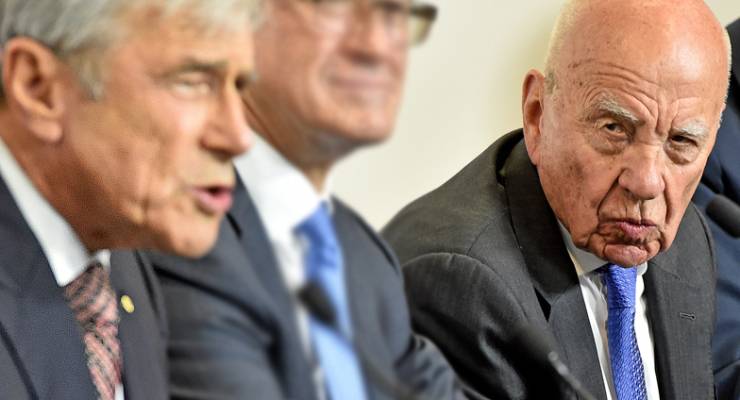
It’s no wonder the legacy Australian media has welcomed the government’s “media reform” package for the sector, sneaked out by Communications Minister Mitch Fifield on the Friday night before the budget. It’s actually an aid package for a powerful industry that is up against unstoppable wave of change.
Even Kerry Stokes, who has managed to almost single-handedly wreck ownership reforms over the last few years with his bitter opposition, is now supportive. Shares in Seven West Media, of which Stokes owns 45%, are down 35% in the past year; Seven — which despite the distractions of Tim Worner’s extramarital affair with Amber Harrison, allegations of drug-fueled sex romps and the network’s heavy-handed treatment of Harrison, has been slashing costs — will benefit from the difference between the abolished licence fees and the new spectrum payments regime (thank you very much, taxpayers). But everyone else (apart from taxpayers) is a winner, too.
Chief among the beneficiaries will be the Murdoch clan. The removal of the two out of three rule on ownership will enable the Murdochs to snap up the struggling Ten Network by buying Ten for a pittance (Sky News, now 100% owned by News Corp, is going to produce news for the Ten Network). News might also snap up all of the Nova radio station group presently controlled by Lachlan Murdoch. Ten and Nova will also be beneficiaries from the abolition of licence fees. Foxtel — co-owned by News Corp and Telstra — will get a subsidy of $30 million over four years to encourage subscription television to increase coverage of women’s sport and niche sports. All up, the Murdochs directly and indirectly could get as much as $100 million in benefits, plus be allowed to tighten their grip on Australian media.
WIN’s Bruce Gordon is another winner — with News Corp’s support, the Bermudan resident and one-time magician is also a potential purchaser of Ten, possibly merging it with his WIN Corporation — while he will be able to retain his 14.9% stake in Nine Entertainment under existing control rules.
Fairfax also does well: CEO Greg “the Four Million Dollar Man” Hywood welcomed the package just as US buyout group TPG was delivering a $2.5 billion offer to buy the Domain property website business, plus The Sydney Morning Herald, The Age and The Australian Financial Review. A potential purchaser of parts of Fairfax will now have greater flexibility to link those with other assets, potentially increasing its value, while its radio assets will enjoy the licence fee rort.
For Nine there’s also the licence fee rort, and the opportunity to link up other assets — it could bid for Fairfax, and merge with a regional television network. Regional broadcasters such as Prime Media Group also win — they’re waiting to be mopped up by someone such as Seven West media (which owns around 11% of Prime) and Southern Cross Austereo, which has ambitions of its own, but will probably be picked off.
Sounds good for everyone — but remember this: every round of media law changes in recent years has meant billions lost from exciting deals that turned out to be duds — the bankruptcies and firesales of TV licences in the 1980s, James Packer flogging off Nine and Consolidated Press to private equity bunnies. That’s not to say only media ownership changes lead to bad deals; the merger of Seven Network and West Australian Newspapers was valued at $4.1 billion in 2011, today the merged company is worth $1.12 billion (the other $3 billion has gone in one of the biggest value-destroying deals in recent memory).
And this is not going to put any fear into the truly big beasts in this jungle, Google and Facebook. Ten years ago, one was just a successful search engine and the other barely existed. Now they are the apex predators of the media industry and will continue to chew up revenues from the legacy companies. All the care packages in the world from government won’t help our media dinosaurs.







I thought it was going to be ‘jobs and growth’ with this Government.
Silly me I thought that meant jobs for the likes of you and me but it is more the ‘growth’ of the coalition’s friend’s financial security.
Well done this government. Mushroom farming of Australia’s citizenry has been given a great boost!
Grim, grim reading . . . all the way through today. Makes one consider that maybe, French electorate offers a lead. Scrap established parties and their self rewarding values of personal greed and power. Open up to a younger generation, prepared to ruthlessly recommit to we overburdened ‘bunnies’ who once believed in fairness, mateship and equity?
Why would Foxtel get the subsidy to broadcast women’s and niche sports? If it’s in the interests of Australians to see these things at least put them somewhere people can see them without having to pay.
And why can’t I watch the 100th Giro D’Italia in Australia? This the one of the largest cycling events in the world and its not available free to air. What happened to anti-siphoning 🙂
It is better to live life in ignorance than to live it informed by any of the Murdoch media outlets.
…. What’s the difference?
Surveys of Fux viewers in the US showed not only where the most uninformed of all audiences but also the most misinformed which is worse than ignorant because ignorance can, sometimes, be dispelled whereas the mendaciously misinformed have had the mean mindedness reinforced by the lies on which they;ve grown fat and are thus the least amendable to persuasion.
Just like those who consume the mudorc’s shit sheets here.
There will be no negative comments by the MSM churnalist, stenographers, typist and typhoid Mary’s on the corporate welfare being ladled out here. A fucking shame and farce by this anti-Australian government. Government for all Australians, jobs and growth, growth and jobs, what a fucking load of bullshit. Shame Malcolm shame on you.